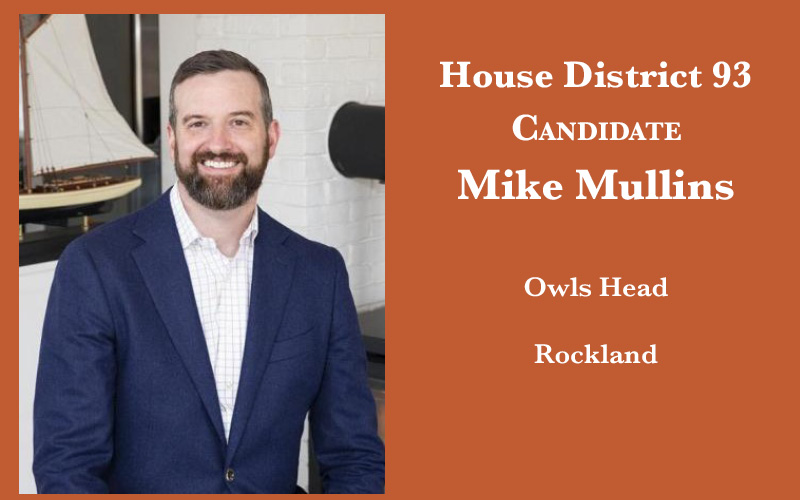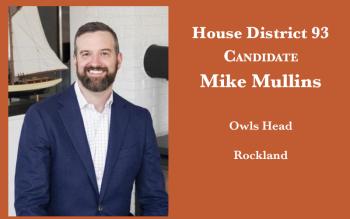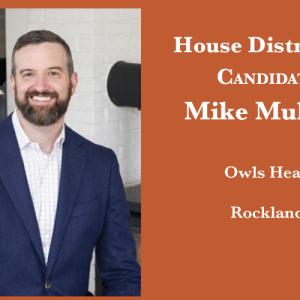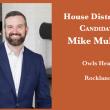On the issues: House District 93 Candidate Michael Mullins
Penobscot Bay Pilot has posed questions to each candidate running for Maine State Legislature, providing the opportunity for the public to better understand their position on issues important to the state. Candidates responding with their individual written answers will have their responses stored in the Pilot’s 2020 Election Resource Guide. Michael Mullins, Republican, is seeking election to represent Maine House District 93, which includes Owls Head and Rockland.
1. Please provide a concise biography of yourself.
I am the owner and manager of Cranesport Garage, a business incubator in Camden, Maine. In 2015, I purchased and restored the former Crockett's Quarry across Maverick Street from the Rockland Golf Club. In 2017 I gained notice for a proposal to buy and convert the MET building in Camden into a makerspace, a shared multidisciplinary workshop with programming for adults and children. I am on the board of directors of Mullins Company, a Boston based developer engaged in mixed-income housing and historic presentation. In the past I sat on the boards of Dublin School, CNU New England, and Caritas Communities, a non-profit dedicated to preservation of single room occupancy housing. I was a fellow in the 2009 Class of Startup Leadership, and Founder of the Lean Startup Challenge business accelerator in partnership with MassChallenge in 2011. I am the founder of Maine Relief, a Maine Title 13 Non-profit that has been producing masks for the community under the name Mid Coast Pop Up Factory.
I have a bachelor degree in Finance from the University of Miami’s School of Business, a Masters Degree from the MIT Department of Urban Studies, and I hold an MBA from the University of Chicago. I have 20 years of experience building and managing affordable housing.
2. What are the three most pressing issues facing Maine, as a state, today, and how would you like to see them resolved?
First and foremost, the Covid-19 pandemic. Second, unemployment, and third, a glaring state revenue shortfall. These issues are related, and they can be solved together. This country is at its best when we mobilize our resources and our people as we did during WWII. Rather than paying people to be idle, we should pay restaurants to make meals, and drivers to deliver them to people who for health reasons must stay home. We should pay people to make masks and test kits, to build infrastructure, like state-wide high speed internet, or to tutor children to support distance learning. In brief, mobilize the economy and American ingenuity to fight the pandemic and rebuild the economy.
3. How will you protect the local (municipal) taxpayer as you help shape a state budget?
There are many ways people propose to shift the tax burden from one state to cities/towns. Most involve a painful tradeoff of either shifting state funding from one town to another, or a big increase in state taxes. There is no way to finagle more funding for all municipalities without raising state taxes, meaning there is no real tax relief to the individual taxpayer whenever anyone talks about getting the State to pay more. It's just shifting it from the left pocket to the right.
I fear that with the current $500 million-plus state shortfall, more state aid is just not on the table because it would mean raising taxes enough to cover the shortfall plus increase state aid. So I would be wary of promises to have the state pay more unless it is explained where the money would come from. This is why it's so important to grow the economy. Because when the economy grows briskly, it spreads the given tax burden over a larger base, which then allows for additional spending without raising taxes on the individual. We must grow the economy to provide the funding we need for our programs and state aid.
4. Given the shortfall of housing in your district, how should the state approach the need for more workforce housing, as well as re-entry housing for the formerly incarcerated, and emergency shelter for those suffering through extended power outages?
We do not have a shortfall of housing in this district. A City of Rockland committee tasked with studying housing affordability found that there are over 500 vacant homes in the City of Rockland, for example. The shortfall we face is one of affordable housing. One factor is the tax burden. Rockland residents may remember times when you could rent an apartment for $600 or a whole house for under $1,000. But a landlord can't rent a place to someone for $900 if they are paying $500 in taxes. The property tax burden is perhaps the biggest drag on the number of affordable homes in Rockland. Code issues, second. There are local code requirements that include sprinkler systems in most single family construction, which is surprising because it is expensive. The City should also be encouraging entry-level housing and making sure that codes do not price it out.
Zoning too is a determinant of affordability, but Rockland's codes already allow multifamily development and relatively small lot sizes. It's easy to find land allowing duplexes, multi-units, or flag lots. The problem from an economic perspective is that rents do not cover the cost of new construction. As long as this is the case, there will be little new construction of rentals. They city should do everything it can to encourage the new construction of homes, which has the follow-on benefit of lowering the tax burden. Another way to reduce the tax burden is to welcome investment in the city. The city has banned new vacation rentals, but this is counterproductive, because that type of investment is needed, and vacation rentals disproportionately contribute to a bustling Main Street. The city should welcome new sources of vitality, and the coast of Maine has always welcomed visitors. The solution to housing affordability is not to try to depress housing prices by tinkering with markets, because as Rockland has seen, the result is that people can just buy those homes and keep them off the market altogether. Rather, the answer is to have a booming local economy and all that comes with it.
The state can play a role as well, in housing production including producing supportive housing and shelters. We need a housing-first policy for dealing with substance abuse and mental health problems. I have 20 years of experience building and managing affordable housing and working with state finance agencies and HUD. I want to elevate MaineHousing into one of the premier state housing finance agencies by expanding rental lending, first-time home-buying programs, and supportive housing programs. The most successful housing finance agencies require no state funding because they actually make money through section 8 contract administration and from portfolio loans and fees. Some actually can return funds to the state treasury every year. We need to make MaineHousing a standout amongst its peers. And further, we can support smart growth at the state level, encouraging Maine's cities to grow without an overgrowth of roads and highways.
5. What legislative committees would you like to serve on and why?
The committees change from time to time. More broadly, I'd like to work on agriculture, because I think Maine needs to have a coherent farm policy to grow food production and a focus on farm intensification, which is going to be the key to reducing the price of local, organic foods, and reducing the total acreage needed to feed the population. Farm intensification returns unneeded and less productive land to nature. It is a win-win. I would also like to work on housing policy, and I am interested in the energy committee, and the Judiciary Committee.
6. Maine’s economy relies on small and micro-businesses. How will you help the entrepreneur succeed in this state, especially given the pandemic?
I have worked with the startup industry for more than a dozen years. I ran my own startup, I ran a leadership program for startup founders, and I founded a nonprofit business competition called the Lean Startup Challenge that had over 30 teams (startups) per year, and I teach a class on Lean Startup Methods. Here in mid coast, I run a small business incubator in Camden, and I proposed a makerspace at the MET building in 2017 that is now opening in Rockland as an interim use at the former Antiques Marketplace building at 25 Rankin Street called Workspace Rockland.
On October 16 I submitted a proposal to build a maker park at the Camden Tannery site. My philosophy, based on helping dozens of startups launch and grow, is that Maine needs to develop what I call an Entrepreneurial Ecosystem, in which we have purpose-built spaces for companies at every growth stage, and social infrastructure, such as networking and entrepreneur training. I practice what I preach; I am already helping small businesses to blossom here in Maine. I will work to share my vision with other legislators and make this a priority statewide.
7. What is your vision for affordable health care?
Some legislators and legislative candidates advocate single payer or 'medicare for all' systems. There are two big problems with that, first I support medical choice, including choice of doctor. Second, as Dwight Eisenhower feared the military-industrial complex, I fear the medical-industrial complex. Large businesses like big pharma and medical insurers must not be allowed to 'capture' regulators, resulting in the proverbial $600 toilet under federal procurement. Healthcare prices are already spiraling out of control. Pouring more money into a broken system will never work. The only way to rein in health care prices is actual competition. Hospitals must publish prices, and we cannot allow hospital systems or insurers to become monopolies.
We need to unleash the power of the American consumer, by providing whatever resources we can to consumers and then allowing them to shop around. My specific idea is to reduce annual limits and replace fixed deductibles, and instead allow consumers to pay a percentage of their costs. We can also encourage and expand minute clinics and try to bring back more family practices by giving small medical practices 'breathing space' from the regulatory burden that has been driving doctors to hospital systems.
8. Does the State of Maine need to improve its public health system?
Public health is a broad topic. We do well with quality of care in our hospitals, and we have expanded Medicare. Where we fall short is in treating opioid addiction, and providing mental health resources, including the problem of insufficient supportive housing. We need improvements in these areas, and in other regards. I'm surprised how little I hear about the treatment of addiction in this election. We need a holistic approach to bringing people back from addiction so they and their families can lead fulfilling and productive lives. The state needs to play a large role and provide resources to do this.
9. What are the greatest strengths in your district, and how do you hope to support them?
Rockland and Owls head benefit from a diverse economy, with tourism, manufacturing, lobstering, and healthcare as leading industries. I will support the growth of service and manufacturing through my vision and support for an Entrepreneurial Ecosystem. The commercial lobster fishery is one of Maine's strongest maritime traditions, and needs to be defended from well intended but ineffective regulations such as the proposed line reduction regulation. I will proactively defend the fishing industry from such measures.
For tourism and main street, I propose an expansion of Maine's already successful historic tax credit, to allow facade preservation that will beautify, preserve, and stimulate our downtowns. And I am proposing a new area of MaineHousing, offering 30 year loans to mixed-used buildings on our main streets that will immediately boost the amount of new housing constructed, and help keep those buildings in good repair, which will beautify our cities and help tourism.
10. What are the greatest problems to address in your district, and how do you intend to address them?
Some obvious choices here are unemployment, covid, lack of healthcare and housing, or addiction. But as a representative, and I can't stress this enough, a constituent's biggest problem is THEIR problem. Across the spectrum. As a state rep, you're part of a big team. You need to get to know the residents in your district, because you can. You need to always be available, whether welcoming a resident into your home, or paying a visit to them. And always make time available to do so. You need to represent all members of your district, regardless of party. So when you ask me what my district's greatest problem is, it's the problem faced by the person in front of me. I will always listen and always make time to help residents of District 93.
11. What is your position on law enforcement reform in the State of Maine?
I support our law enforcement. I organized a family fun day for Knox County Police, Sheriff's department, Corrections, Parole, Harbor Patrol, and Fish and Game wardens, because I did not like to see them feel targeted or censured for something as simple as their occupation, and because they are members of our community. I believe one of the most important ways to support law enforcement is to invest in their training, such as de-escalation, intervention, and the implementation of reforms that align our police with the general population.
I am opposed to civil asset forfeiture laws that deprive people of property without due process. This is a civil rights issue. It is one that sets the state's financial interest against that of the citizen, and raises constitutional concerns. I am firmly against the militarization of police, including the use of military equipment in America's neighborhoods and the adoption of tactical gear and methods. I am a proponent of what I call the Andy Griffith model of policing, in which police and law enforcement are seen as members of the community there to help.
12. What are your thoughts about the state’s response to the pandemic?
I think the Governor was in a very difficult position, wherein one week her staff tells her everything's going to be fine, and two weeks later they warn that this virus could kill in the thousands or even millions. I disagree with the state and federal response in one regard. We are at our best when we mobilize our community. When we work together, to innovate and produce and adapt. For example, when we knew that the vulnerable needed to stay home, we could have kept our restaurants working, through a state program to pay them to prepare meals, and to deliver them to those who are in need. We could have hired people to tutor students to make up for the shortcomings of distance learning, and to make test kits.
I believe that people in the position to do good need to take action. When the pandemic hit, I was away in Mexico for a wedding that was cancelled, when Americans were told to return home by the Secretary of State. I was faced with the prospect of going home and quarantining. I thought, maybe I can do something to help. And maybe I can do something that would create a way for others to help as well. So I decided to try to set up an ad-hoc factory to make PPE and masks. I started ordering all the materials I could get my hands on from my hotel in Mexico. Within six weeks we went from prototype to making over 2,000 masks and mask kits per week. It was an all volunteer effort and we made over 7,000 masks and kits. This is Maine. We are resourceful and capable, and we can handle this pandemic. #Maine #WeGotThis.
13. Do you support construction of the 145-mile Central Maine Power transmission line from Quebec to Massachusetts?
I do because we need to transition to renewable energy. When asked whether I support the CMP corridor, I respond that if it were up to me, I would approve it if they make the towers 40 feet taller so that they don't have to cut all the trees down, and can let the forest regrow. Because I don't think Mainers oppose the transportation of clean energy. I think they oppose the scar across the earth. I think if the power line were out of sight, with a healthy forest below, and some kind of environmental net benefit, we could feel better about embracing this form of clean energy.
14. Free space! Is there anything else you want voters to know about you or your vision not addressed through this questionnaire?
I think that the best days of this country and this state lay ahead. I am so optimistic about the future of Maine. We have all the resources we need here in Maine — a beautiful environment, clean waters and natural resources, strong schools, and people willing to work hard by their very nature. As this nation recovers from the social and economic turmoil of the last two decades, Maine is positioned to be a strong, resilient state.
And I think we can take the lead in solving some of the country's most pressing problems, like carbon dioxide emissions, and transitioning to renewable energy. I'm a person who takes action, and one who loves to solve problems — the harder, the better. I'm asking that you give me a chance to go to Augusta and to bring my energy and creativity to work on fixing some of those problems.
Event Date
Address
United States




























